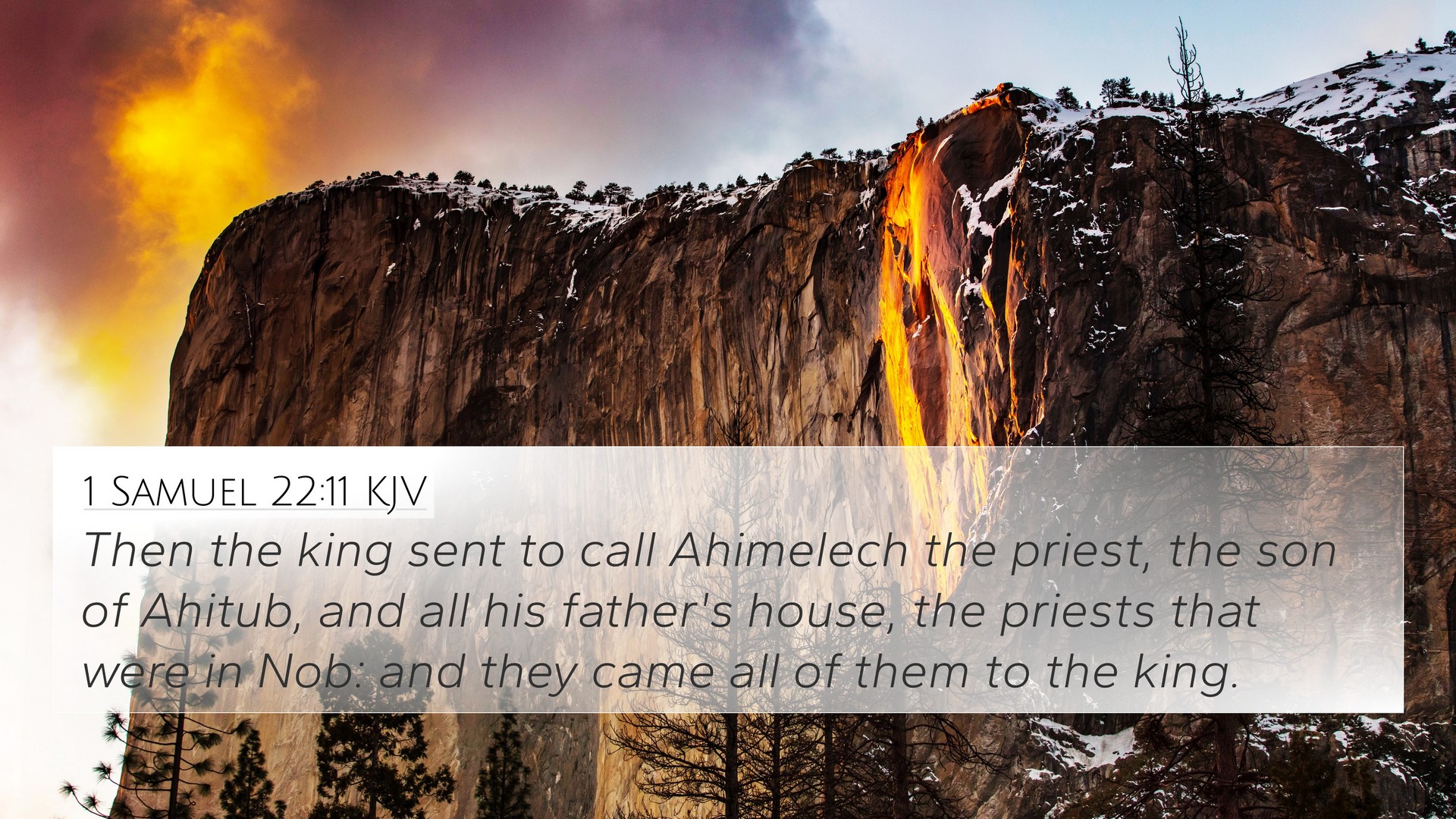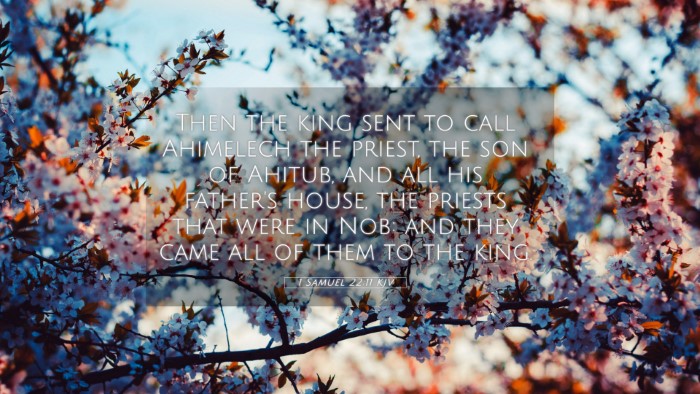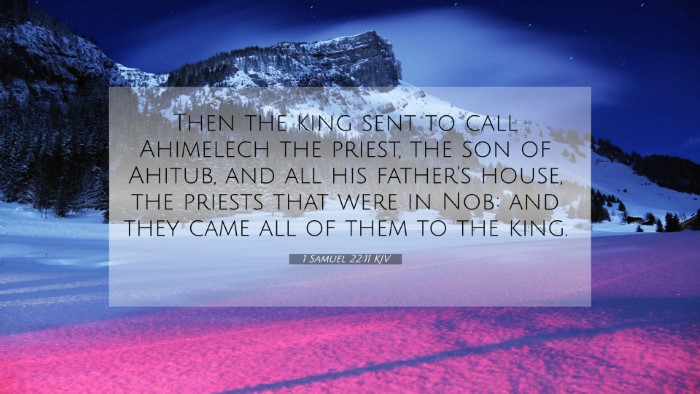Understanding 1 Samuel 22:11
Verse: 1 Samuel 22:11 reads, "Then the king sent to call Ahimelech the priest, the son of Ahitub, and all his father's house, the priests that were in Nob: and they came all of them to the king." This verse serves as a pivotal moment in the narrative of King Saul and the priest Ahimelech, highlighting themes of authority, betrayal, and the consequences of political maneuvering.
Summary of Insights
The following insights are derived from public domain commentaries by Matthew Henry, Albert Barnes, and Adam Clarke:
-
Matthew Henry:
Matthew Henry explains that this verse marks a crucial point where King Saul seeks Ahimelech after the priest aids David. It reflects Saul's increasing paranoia and desire for control. The king’s summon of Ahimelech indicates his authority, yet it foreshadows the tragic outcomes of his wrath and the moral dilemmas faced by the priests who have to choose between loyalty to God and to a king who has turned against the Lord.
-
Albert Barnes:
Albert Barnes highlights the significance of Ahimelech’s lineage and the role of the priestly family in Israel. He comments on how Saul's actions reveal his desperation and deteriorating leadership. The author contrasts Saul's authority with David's emerging leadership, emphasizing the growing tension that will lead to tragic outcomes for both Saul's kingdom and the priestly line.
-
Adam Clarke:
Adam Clarke notes that the calling of Ahimelech signifies Saul's isolation and misjudgment. The text points out the irony of seeking the help of a priest while simultaneously forsaking the ways of the Lord. Clarke also discusses the ethical implications of Ahimelech's actions in providing assistance to David, underlining the conflict between divine command and human authority.
Connections and Cross-References
This passage can be linked to several other Bible verses that enhance our understanding of its themes:
- 1 Samuel 21:1-6: This section describes the previous encounter between David and Ahimelech, where David receives help from the priest, setting the stage for Saul’s inquiry.
- Psalm 52: A psalm reflecting on the actions of Doeg the Edomite, who reveals Ahimelech's assistance to David, and the implications of betrayal.
- Exodus 22:28: This verse discusses the treatment of priests and leaders, underscoring the gravity of their roles in society and God’s judgment on kings who abuse their authority.
- 1 Samuel 15:23: Here, the rebellion against God is highlighted, showing Saul's failure as a leader and setting up the consequences of his actions against Ahimelech.
- 2 Samuel 8:17: References the Levites and priests in the context of David's kingdom, portraying a contrasting leadership that honors God.
- Matthew 12:3-4: Jesus references David’s actions regarding the showbread, linking themes of necessity and divine precedence over human laws which resonates with Ahimelech’s assistance to David.
- Hebrews 5:4: Discusses the divine appointment of priests, again highlighting the role of priests like Ahimelech in Israel's spiritual life.
- Acts 4:18-20: Reflects on the consequences of declaring one's loyalty to God over earthly authority, engaging themes seen in Saul's summons to Ahimelech.
- John 15:18-19: Jesus warns His followers about the world’s hostility, akin to the betrayal Saul represents against those loyal to God's anointed, like David.
- 1 Peter 2:9: Relates the concept of being a chosen generation, paralleling the duties of the priests and how believers are now seen in light of Jesus’ sacrifice.
Thematic Connections and Insights
Exploring the themes found in 1 Samuel 22:11 helps to facilitate a deeper theological understanding:
- Betrayal and Loyalty: The conflict when human authority challenges divine purpose – Ahimelech’s loyalty to David contrasts with Saul’s misguided sense of loyalty to his kingship.
- The Role of Authority: The workings of divine authority versus human authority are stark, as Saul’s kingly power begins to unrave while David, although on the run, acts righteously.
- Consequences of Political Actions: Highlighting how the actions taken by leaders have far-reaching impacts on innocent lives, in this case, it leads to the tragic fate of the priests in Nob.
- The Need for Divine Guidance: The verse underscores the necessity for godly wisdom in leadership; without it, kings can descend into paranoia and tyranny.
Conclusion
1 Samuel 22:11 serves as a poignant reminder of the complex alliances and the severe consequences of moral choices in leadership. By studying this verse alongside its cross-references, believers can glean wisdom about the nature of God’s sovereignty, the importance of righteous leadership, and the implications of our choices within established authority structures.



